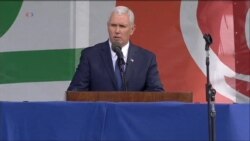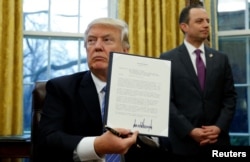Thousands of anti-abortion activists poured into the nation's capital on Friday for the March for Life, an annual gathering that was energized this year by the changes expected under the administration of Donald Trump and the Republican-led Congress.
Vice President Mike Pence, a longtime abortion opponent, addressed the rally near the U.S. Capitol in Washington.
"Life is winning," Pence told protesters during his remarks Friday.
WATCH: Pence remarks at rally
Before Pence addressed the crowd, Trump posted a message on Twitter expressing his support for the march. "You have our full support," he tweeted.
Just days after a half-million people marched for women's issues, including the protection of reproductive rights, during the new administration, demonstrators in the 43rd annual March for Life walked the same streets, protesting the U.S. Supreme Court's landmark 1973 Roe v. Wade decision legalizing abortion.
Historic involvement
Longtime demonstrators said Pence's support — the first time a sitting vice president has addressed the March for Life rally — provided welcome encouragement.
"It's a great shot in the arm," said Kevin Morrissey, a New Jersey resident who has participated in the march since the early 1980s. Morrissey said he's also encouraged by the numerous school bus groups who travel from around the country to participate.
"I think when you look at the age of this crowd, this cause is not going away," he told VOA.
The March for Life has always attracted a large student contingent. Khloe Smith, a student at a Catholic school in New York City's Queens borough, said that even though she's not a Trump supporter, her second time marching at the event felt different because of Pence's involvement.
"I think he's here to help," Smith said. "I think he has the best intentions to help and I think that's all that matters."
Many demonstrators mentioned media coverage of the half-million participants in the Women's March on Washington last week, saying the exclusion of anti-abortion groups made them feel their voices were not being heard.
"One, I was told I was not welcome because I was pro-life, then I found out it wasn't a Women's March," first-time participant Thelma Shelton told VOA. "It was a pro-Hillary, pro-abortion march under the guise of a woman's march."
Contentious debate
The two demonstrations coming just days apart provide a window into one of the country's most contentious issues, illustrating that both sides have no intention of backing down, with congressional and executive actions giving new hope to the cause of anti-abortion activists.
A small group of abortion rights supporters, who were staging a counterdemonstration at the Supreme Court as March for Life demonstrators filed past, said it was important to mark the anniversary of Roe v. Wade positively.
"Even though it's the law of the land, I see this as a continuation of chipping away at abortion rights," Polly Stamatopoulos, a Washington resident, told VOA. "This is going to be a continuing attack on sexuality and woman's sexual freedom."
In one of his first acts in the Oval Office, Trump signed an executive order applying the so-called "Mexico City policy," preventing U.S. funding from going to any foreign organizations that perform or promote abortion.
The policy referred to as the global gag rule by opponents — has always flipped according to the party that controls the White House. Since 1984, Republican presidents have implemented it, while Democratic presidents have rescinded it; but opponents argue Trump's executive order goes one step further than past Republican presidents.
"What President Trump has done has been to extend the reach of the global gag rule," Jamila Taylor, a senior fellow covering women's health and reproductive rights at the Center for American Progress, told VOA. "It's now applicable to all global health funding."
Trump has had an inconsistent record on abortion — describing himself as "very pro-choice" in 1999, before going on to court controversy during the 2016 presidential campaign when he said women seeking abortions should face "some sort of punishment."
The White House reaffirmed the president's commitment to the cause Monday when press secretary Sean Spicer told reporters, "It's no secret that this administration and this president are going to do what they can to fight for life."
Anti-abortion activists welcome the president's support, even if he can't match the depth of their commitment.
"President Trump is an opportunist when it comes to the pro-life cause and we're happy for his opportunism," Chad Pecknold, a professor of theology at the Catholic University of America, told VOA. "I think the movement is happy with that. Even if you opposed his presidency, even if you opposed his candidacy, I think we're grateful for any support he lends to the cause."
Congressional action
Just days after the Women's March on January 21, members of the Republican-controlled House of Representatives battled over permanently restricting federal funding for abortion.
"Millions of women and men across the country — including myself — marched with one goal in mind: to let the world know that our rights must be respected and protected," said Congresswoman Yvette Clark, a Democrat from New York, as she argued against the bill's passage. "A woman's right to abortion should be a personal choice that she makes, not a decision that government makes for her."
Congresswoman Diane Black, a Republican from Tennessee who led the fight for passage of No Taxpayer Funding for Abortion and Abortion Insurance Full Disclosure Act, told House members Tuesday, "All life is a precious gift from God. I pray that in time this truth will be reflected in our nation's laws."
House Speaker Paul Ryan marked the passage of the bill by a 238-183 vote with a tweet announcing "We are a #pro-life Congress." Pro-choice advocates, however, strongly push back on that claim.
"The Congress is way out of step with the American public and what the American public supports in terms of access to abortion and health care for women," Taylor said.
Americans' views
In a 2016 Pew survey, 57 percent of Americans said abortion should be legal — a number that has remained consistent over the past two decades.
But, as noted by Catholic University's Pecknold, those numbers change when the public considers different kinds of abortions and federal funding for them. He sees the open discussion of those distinctions as a way of advancing the movement's cause while changing the national debate about abortion.
This week's introduction on the House floor of a bill that would severely curtail Roe v. Wade, preventing any abortions after a doctor detects a heartbeat on an ultrasound, could be that first step.
"This is exactly the right kind of legislation to advance the pro-life cause with those who ordinarily disagree with us, but are open-minded and want to consider all the facts," Pecknold said.
"We think this bill, properly applied, does eliminate a large, large share of the abortions — 90 percent or better — of the abortions in America," Congressman Steve King, a Republican from Iowa sponsoring the bill, told reporters.
While the bill is likely to face a tough fight in Congress, it's part of a larger strategy to eventually bring the abortion issue back to the Supreme Court.
The Republican-controlled government's greatest impact on the abortion debate could come from the confirmation of enough anti-abortion Supreme Court justices to eventually overturn Roe v. Wade. Trump is expected to announce an anti-abortion nominee to fill the court's vacancy just six days after demonstrators march in the streets of Washington to mark that anniversary.











